HOW TO GET BACKLINKS TO YOUR WEBSITE
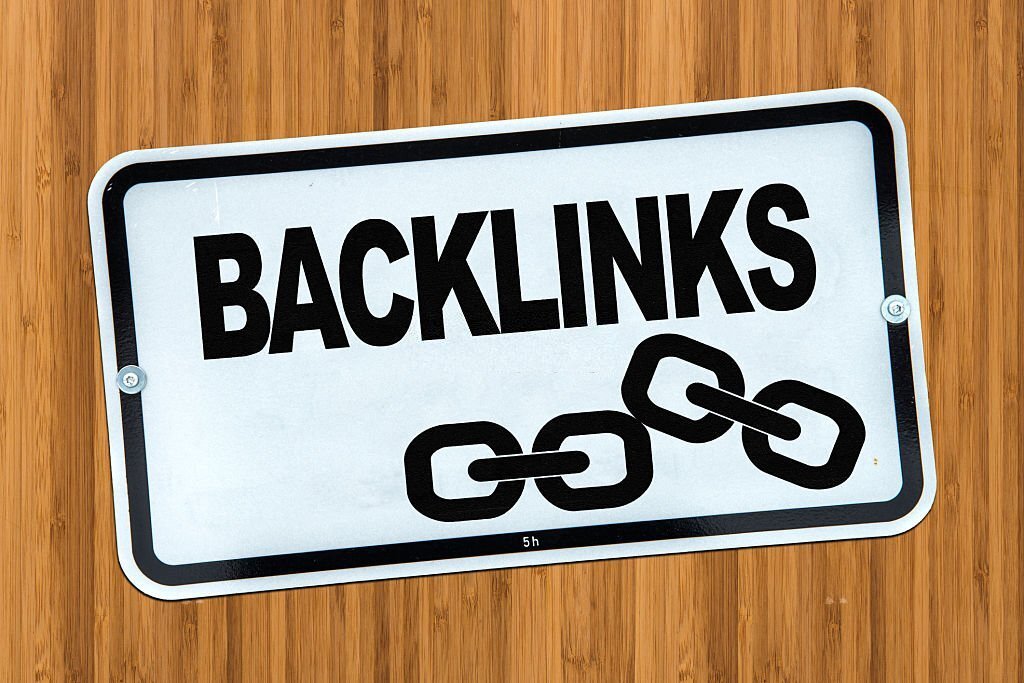
Backlinks are very important for your website to rank on the first page of google search, popular search engines such as Google, Bings, and Yandex make use of backlinks as a pointer to quality content that has the of another website.
Pages with high backlinks stand more chance of ranking top of the search engine research page, therefore the more backlinks you have the more organic search your website would have.
What are Backlinks?
Backlinks are simply links other than yours on other people’s websites but when clicked they link back to your site.
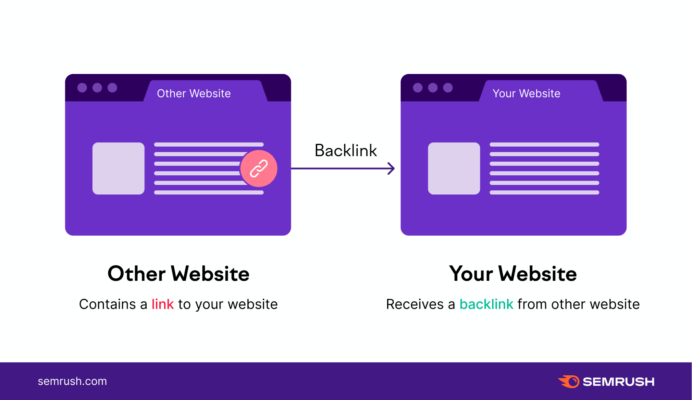
Why do you need Backlink to Boost your SEO ranking?
If you have big plans on ranking on the first page of google with your article from your website, then getting tons of backlinks should be paramount to you.
Backlinks are soo vital to getting your blog noticed by search engine algorithms, good backlinks, can help your SEO efforts and contribute towards website traffic.
Quality of a Good Baclink
Owners of websites can attest to times other bloggers leave links in their comment sections in a bid to get backlinks to their sites, such practice is not the best way to generate backlinks because google would rather consider that as spamming links and the backlinks would not be counted.
A good backlink could be generated when a website with a high reputation sends links to your site that show a fantastic vote of confidence in your website.
Google measures the popularity of a website by the number of backlinks they possess, thereby giving such websites a high ranking.
Lest we forget any link from someone’s else website to yours is termed backlinks, if your website receives quality backlinks from strong authorities within your niche that tell Google how good your content is, Google uses those recommendations to determine the ranking of pages.
15 Ways to Improve your Backlinks today?
1. Understand What Site Owners Are Looking For
Some sites get links just because they pitch themselves well. On the flip side, even sites with amazing content that can’t pitch themselves well don’t get backlinks.
This is why you have to nail this part of your request.
Like every part of marketing, it’s about knowing what your audience is looking for and speaking to that in your request. If you only talk about how amazing you are and miss the key points of what they are looking for, you’re likely to be overlooked.
The next few tips will cover some of those things site owners look for.
2. Emphasize What Benefits the Site Gets
The reason why any blog accepts backlinks is ultimately to help themselves. To get a link, you have to tell the site owner what benefits they will get.
Here’s a little secret: Most sites are looking for the same benefits, such as:
- content relevant to their site
- detailed content
- well-written content
- a legitimate site
3. Write Relevant and Competitive Content
If you don’t have content worth linking to, no one will link to you. At the heart of generating backlinks is creating great content, and it needs to be better than other content in your industry.
Here’s a simple way to do that. Type the topic of the keyword you’re looking to target into Ubersuggest and click “Search.”
Click on these titles to browse the articles, looking for:
- How many images does the blog post have?
- What is the word count of the blog post?
- What is the title?
- What is the featured image?
- What is the title tag and meta description?
Follow up with these tactics in your article:
- Include higher quality images than any of the competition.
- Have a higher word count on your blog post—or at least make every word matter.
- Write a more compelling title.
- Use an interesting featured image.
- Write a title tag and meta description that is more focused.
Essentially, your goal is to analyze the competition, then do everything better.
4. Keep the Content Detailed and Deep
We talk a lot about long-form content, but comprehensive content might be even more important.
You can have a 6,000-word article that’s trash or a 1,000-word article that hits it out of the park.
The sweet spot is somewhere in the middle. If you write long content, it will naturally have to be detailed. Longer content gets more links and usually has higher SERP rankings.
Readers love long-form content (and search engines do too).
All of that said, if you have to choose either detail or length, go with detail.
5. Make Sure the Content Is Well-Written and Well-Produced
Your content has to tell readers something clearly.
Seth Godin’s blog is a great example of this. He posts every day in a voice that’s casual and often breaks the rules of grammar.
People love Seth’s blog because it brings a unique perspective to the table. The improper use of a semicolon isn’t going to turn readers away from that.
Don’t ignore grammar, but don’t get obsessed with it.
The same goes for content that isn’t text-based, like videos and infographics. Share knowledge that’s worth your readers’ time.
6. Prove Your Site Is Legitimate
You don’t have to have a custom design theme to appear legit, but make sure that the sites you’re pitching know you’re the real deal.
Linking to your social profiles can help with that.
If your site is new, you won’t have much clout. You’ll have to be even more persuasive. Put in the hard work to create top-tier content, and you might very well be rewarded.
7. Sell Your Value
It sounds pretty simple, right? Yet, this step can often be overlooked. Your link request needs to sell your article or page as an invaluable resource, and you need to make the benefits crystal clear.
Here’s a good example:
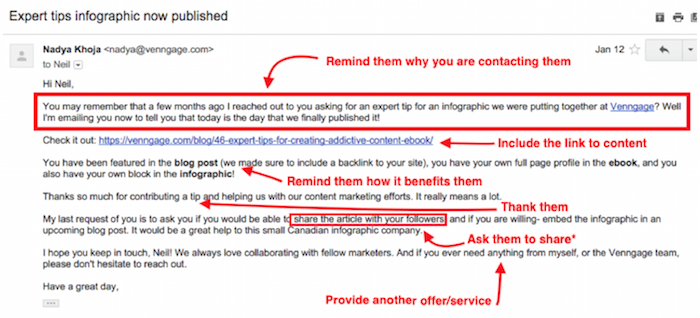
How can you communicate benefits in your pitch?
You need to have real benefits to offer.
The most important benefit is relevant content. You need to have something that will add more value to the resource you’re inquiring about. Having a relevant article is all you really need, but if you can offer more, that’s even better.
Specifically, if you have an established audience you can promote to, that’s gold. That’s what every site owner dreams of.
8. Make Your Pitches Short
Brevity matters a lot. Take a look at an example of a pitch:
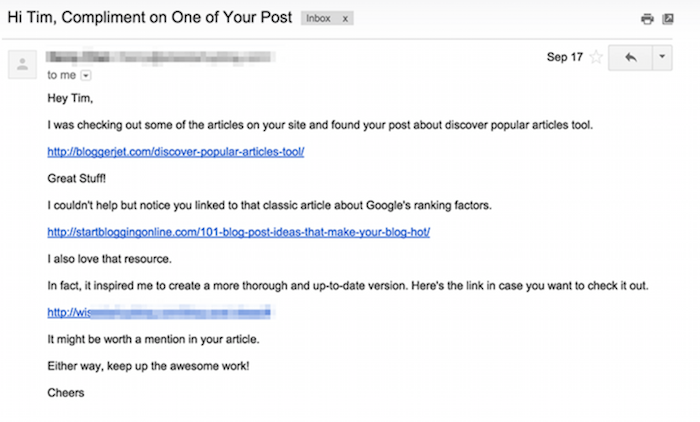
There are lots of single lines, and it’s easy to find and click on the links. It’s to the point, and there’s no question what the email is about.
9. Leverage Public Relations
Building relationships is one of the best ways to build backlinks. When people don’t know who you are, they won’t link to your website.
One great way to start building relationships and establishing yourself as an expert in your industry is by being active on social media.
Here’s a post from Michaela Alexis, for instance.
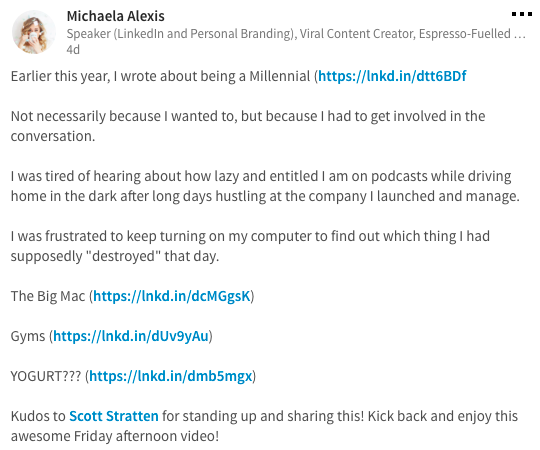
What does she do well here? She keeps her personality intact.
Avoid sounding boring and bland. Rather, insert a bit of yourself into each statement.
As you stay active on social media, you’ll start interacting with a variety of people. You’ll have the opportunity to meet others in your industry and maybe even guest blog for them or hop on a video call. When the opportunity comes, don’t pass it up.
Guest blogging can quickly turn into a backlink, and establishing yourself as an expert can do the same when people ask you for a quote on a particular topic.
10. Do an Original Study
If you have data no one else has, that makes you a valuable resource. When others want to reference your study, they have to link to where they got it.
That means you’ll get a backlink. Doing your own study may seem like a massive amount of work.
Google Forms has the answer. You can create a custom survey, copy the link, and send it out. This is a simple way to create an original study, collect your own data, publish it, and encourage backlinks.
After all, you’re the only one with the data.
11. Create an Infographic or Original Image
Since infographics are visual and easy to scan, readers love to browse them. That means content marketers love to share them.
If you create an infographic for your website and someone shares it on their site, they have to link to your website. You can create an infographic for free or a small price (depending on the graphics you choose) with tools like Venngage. Once you create and publish your own infographic, you can also reach out to other blog spaces in your niche and ask them to share it if it’s pertinent.
12. Write Testimonials for Other Websites
Writing testimonials or reviews for others might sound counterintuitive, but doing so could be good for your SEO and backlinking strategy.
When you do, the website may include a spot for a backlink or link to your website.
While it feels like you’re helping the other business generate leads, you’re also helping your own website’s rankings. That’s well worth the small contribution.
13. Link Externally and Then Reach Out
Why would you spend time linking to other people’s websites?
Think about this: You link to another website and then reach out to let them know you enjoyed their article so much you shared it on your own website.
Since you gave them a backlink, it’s not unlikely they’ll give you a backlink in the future.
Here’s what you could say:
Hello, [name]!
I just wanted to let you know that I really enjoyed your [blog post you linked to]. You’ve been creating content for quite a while, and I’ve always found your information valuable to my business.
In fact, I enjoyed the particular article so much that I linked to it in [the article you wrote]. Let me know what you think of the piece!
I’ll keep doing what I can to share your remarkable content with my audience in the future.
Thanks again for all the awesome insight.
[your name]14. Comment on Other Relevant Blog Posts
Before you go off and start passionately commenting on other blog posts and throwing out backlinks every which way, let me explain something.
While you might occasionally have an opportunity to tactfully include a backlink in your comment, more often than not, the comment needs to be for the primary purpose of building a mutual relationship with the author:
- If you don’t know what to say, make the author’s day.
- If you want to share a bit more, you can add some meaningful insight into the topic at hand.
- If you want to craft a comment that merits a response from the author and helps build the relationship, add your own commentary to the discussion.
That’s a recipe for relationship building, which is a recipe for backlink building.
15. Align Social Signals
If you’re serious about building out your backlinking strategy and rising through the ranks, then aligning social signals is a must.
Social signals communicate to search engines how active and updated your website is. The more active your website, the better your rankings.
You may not have the time to leverage every single social platform. In that case, choose one or two that you can keep up with, and post at least once a day on the platforms you’ve chosen.
Check that all of the information on your social profiles matches your website’s information. Things such as company name, address, and phone number need to be aligned to communicate to search engines that your website is up to date.
This is a simple but effective way to build your rankings with very little extra work.
